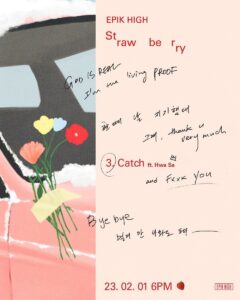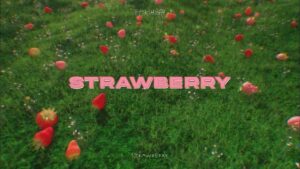
When thinking of the Salem Witch Trials, there are two groups of people that come to mind: the accusers and the dead. But what about the other 180 people accused, several of whom were convicted and survived due to sheer luck? How did those people go back to their lives, living alongside those who bayed for their blood?
That is the sentiment that drives Epik High’s new EP, Strawberry. More than a decade later, Tablo is confronting the trauma inflicted on him by the TaJinYo harassers. More importantly, he, Mithra Jin, and DJ Tukutz are making their audience confront it. Yes, Tablo was vindicated and eight people went to jail. But Tablo is still haunted by the reality that most of the people who set out to ruin his life for no reason are still walking around, having a nice day. The title neatly encapsulates the vulnerability of people in the arts. Strawberries are fresh, delicious, well-loved– and utterly helpless if someone decides to smash them into pieces.
The instrumentation is Strawberry’s most subtle feature. Jazzy, lush, and full of organic instrumentation, it taps into an almost-nostalgia. Tukutz’s arrangements have elements of the 70s without echoing anything specific. If disco had a chill cousin, it would sound a lot like Strawberry. It is utterly blissful, but Epik High has not started chasing the vibe.
Instead, Strawberry comes off as an anti-vibe EP. It’s relaxing, disarming even, but when laying under the lyrics, it creates a sense of melancholy. The biggest issue with vibe music is that it encourages mundanity. Not something to be sought out, but something no one skips, just in one ear and out the other. But if you try that here, you miss the entire point. Rich lyrics with musings on humanity and lingering trauma, reflecting the modern world’s worst qualities, and they’ll slip right by if you’re not paying attention. And that unwillingness to meaningfully engage with art, or to fully think about one’s actions, are the root cause of this EP.
Tablo’s lyrics across Strawberry are stunning. Over ten years of anger, resentment, and frustration spilled over the deceptively laid-back instrumentation. Mostly, though, it showcases how at loose ends unresolved trauma can make someone. “On My Way” plays with the title’s dual meaning as a departure and an arrival– Tablo’s leaving because he is done tolerating abuse, but also coming back because music is his life, and he won’t let it flounder by his absence.

“Catch”, meanwhile, sees Tablo digging into the quiet rage that comes from having your life ripped apart for the crime of success. As he points out, his accomplishments are all things that require immense creativity and dedication, coming almost entirely from within. “Not just self-made, but handmade”, to quote the man. And when chatting with God on the closing track, a fierce bitter streak appears.
Despite proclaiming that he can take the truth without sweetening it to make it palatable, God doesn’t answer Tablo’s question about who goes to Hell. Is it because not even God knows, or does God know Tablo asked hoping for cosmic vengeance on those who wronged him, and he will not like the answer?
One might think that, as Strawberry is formed by a crime against Tablo, Epik High’s other rapper would get overlooked. Not so. Mithra Jin wasn’t the target of organized harassment, but he did have to watch his friend and colleague suffer, unable to help. That one-step removal means that while Tablo is still trying to cope with the trauma, Mithra has gained a clear insight into those who inflicted it. His verses provide a balance; calm musings against the raw emotions.

Mithra’s verses thrive on a cynical awareness of his position as a successful artist. Music is now a hobby, something to be pursued out of passion alone. The demands of a fickle audience mean nothing to him anymore. The petty jealousies of those who try and fail to mimic him are met with wry amusement– even if he quit, it wouldn’t help those who can only destroy the works of others. And while Tablo wonders who goes to hell, Mithra knows damn well that hell is other people. He pinpoints the need to always be right, to be God, as the root of human misery. Not only does being God allow you to pass judgment without impunity, it grants the freedom from having to take responsibility for your own unhappiness. After all, if you’re always right, then your life cannot be your fault.
The odd track out is “Down Bad Freestyle”. Rough, angry, heavy on the bass, simple in arrangement, it’s the blunt hammer to Strawberry’s sharp knives. This is Tablo’s furious indictment of cancel culture and how it turns people’s lives into entertainment. It does not matter what kind of person you are– the attackers, the wait-and-see-ers, or those who grab some popcorn and watch the show– everyone gets something out of it, with no recognition that there is an actual person being put through hell on the other side. And if you try to speak against it, you become the next victim. “Down Bad Freestyle” serves as an excellent reminder for the entire internet to go touch grass.
Strawberry is, in the words of Epik High themselves, an “irreverent fuck you”. It is an acceptance and embracing of the fact that they no longer need to earn an income, and can create whatever and however they want. It’s about trauma and its knock-on effects on everyone. Subtle, sharp, frustrated, insightful, it is a gorgeous EP. But mostly, you listen to Strawberry and hope making it helped Epik High find some sliver of peace.


